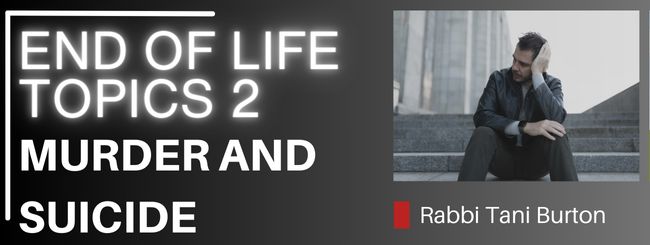בס”ד
I. PERSONAL AUTONOMY FROM A JEWISH PERSPECTIVE
- Tattoos
| Leviticus 19:28 And you shall not make any cuttings in your flesh for the dead, nor imprint any marks upon you: I am G-d. | ויקרא פרק יט (כח) וְשֶׂרֶט לָנֶפֶשׁ לֹא תִתְּנוּ בִּבְשַׂרְכֶם וּכְתֹבֶת קַעֲקַע לֹא תִתְּנוּ בָּכֶם אֲנִי יְקֹוָק: |
2. Why not?
| Sefer HaChinuch, Commandment 253 For it was a custom of the Gentiles to mark themselves for their idol worship, indicating that one was a servant sold to the idol and branded for its service. | ספר החינוך מצוה רנג שהיה מנהג הגוים שרושמים עצמם לעבודה זרה שלהם, כלומר שהוא עבד נמכר לה ומורשם לעבודתה. |
3. As applied to oneself
| Talmud, Bava Kama 91a One is not allowed to injure oneself | תלמוד בבלי מסכת בבא קמא דף צא עמוד ב אין אדם רשאי לחבל בעצמו |
4. The concepts connected
| Maimonides, Laws of Injury and Damages 5:1 It is forbidden to injure oneself or one’s fellow. | רמב”ם הלכות חובל ומזיק פרק ה הלכה א אסור לאדם לחבול בין בעצמו בין בחבירו |
5. Donate one’s body to science?
| Resposa, Igros Moshe Yoreh Deah 3:140 As to the question posed from the Office of the President in Washington regarding the use of the organs of a corpse for medical purposes, as commanded in that person’s will: I respond concisely according to Torah law which the Sages received one from another back to Moses our teacher, peace be upon him, which he in turn received at Mount Sinai. No one has ownership over his body to the extent that he can command that others use his body—or even one small limb—for any purpose, not even for medical research. How much more is this true of his children and relatives; they certainly have no ownership of his body. | שו”ת אגרות משה חלק יו”ד ג סימן קמ בדבר שנשאל מוואשינגטאן מלשכת הנשיא (אפיס של הפרעזידענט) בדבר שמוש באברים של המת על פי צואתו לצורך רפואה, הנני משיב בקצרה כי על פי דין התורה שקבלו חז”ל איש מפי איש עד משה רבינו ע”ה שקבלנו מסיני אין שום אדם בעלים על גופו לצוות שיעשו בגופו ואפילו רק באבר אחד מאבריו שום דבר אף לא לצורכי השגת ידיעה לעניני רפואה, וכל שכן שבניו וקרוביו אינם בעלים על זה |
II. MURDER AND SUICIDE
What is considered murder and/or suicide in the Torah?
6. The prohibition against murder #1
| Genesis 9:6 One who spills the blood of man, through man his blood shall be spilled, for in the image of G-d did He make man. | בראשית פרק ט (ו) שֹׁפֵךְ דַּם הָאָדָם בָּאָדָם דָּמוֹ יִשָּׁפֵךְ כִּי בְּצֶלֶם אֱלֹקים עָשָׂה אֶת הָאָדָם: |
7. The prohibition against murder #2
| Exodus 20:12 You shall not murder | שמות פרק כ (יב) לֹא תִּרְצָח |
8. Liability for murder
| Genesis 9:5 However, I will demand an account of the blood of your souls; I will demand it from the hand of every beast. From the hand of man, even from the hand of man’s own brother, will I demand an account of man’s soul. | בראשית פרק ט (ה) וְאַךְ אֶת דִּמְכֶם לְנַפְשֹׁתֵיכֶם אֶדְרֹשׁ מִיַּד כָּל חַיָּה אֶדְרְשֶׁנּוּ וּמִיַּד הָאָדָם מִיַּד אִישׁ אָחִיו אֶדְרֹשׁ אֶת נֶפֶשׁ הָאָדָם: |
9. Explanation of source #9
| Maimonides, Laws of Murderers and Guarding One’s Life 2:2 But one who hires a murderer to murder one’s friend, or sends his servant to do so, or binds up his fellow and leaves him in front of a lion or the like, and the animal kills him; even one who kills himself—each one of these is considered a murderer, guilty of murder, and liable to death at the hands of Heaven, although they are not punishable by a human court. | רמב”ם הלכות רוצח ושמירת הנפש פרק ב הלכה ב אבל השוכר הורג להרוג את חבירו, או ששלח עבדיו והרגוהו, או שכפת חבירו והניחו לפני הארי וכיוצא בו והרגתו החיה, וכן ההורג את עצמו, כל אחד מאלו שופך דמים הוא ועון הריגה בידו וחייב מיתה לשמים ואין בהן מיתת בית דין. |
10. Permutations of murder
| Maimonides, Laws of Murderers and Guarding One’s Life 2:3 From where do we derive that this is the law? The Torah states (Genesis 9:6), “one who spills the blood of man, through man his blood shall be spilled”—this refers to one who murders without the aid of an agent. “I will demand an account of the blood of your souls” (Genesis 9:5)—this refers to one who kills himself. “From the hand of every beast” (ibid.)—this refers to one who binds his fellow in front of an animal so that his fellow will be attacked. “From the hand of man’s own brother will I demand an account of man’s soul” (ibid.)—this refers to one who hires others to murder his fellow. In all three cases the expression “demand an account” is used to indicate that the judgment is given to Heaven. | רמב”ם הלכות רוצח ושמירת הנפש פרק ב הלכה ג ומנין שכן הוא הדין, שהרי הוא אומר שופך דם האדם באדם דמו ישפך זה ההורג בעצמו שלא על ידי שליח, את דמכם לנפשותיכם אדרוש זה ההורג עצמו, מיד כל חיה אדרשנו זה המוסר חבירו לפני חיה לטרפו, מיד האדם מיד איש אחיו אדרוש את נפש האדם זה השוכר אחרים להרוג את חבירו, ובפירוש נאמר בשלשתן לשון דרישה, הרי דינם מסור לשמים. |
By Rabbi Tani Burton
© Copyright, all rights reserved. If you enjoyed this article, we encourage you to distribute it further.
Our blogs may contain text/quotes/references/links that include copyright material of Mechon-Mamre.org, Aish.com, Sefaria.org, Chabad.org, and/or AskNoah.org, which we use in accordance with their policies.
